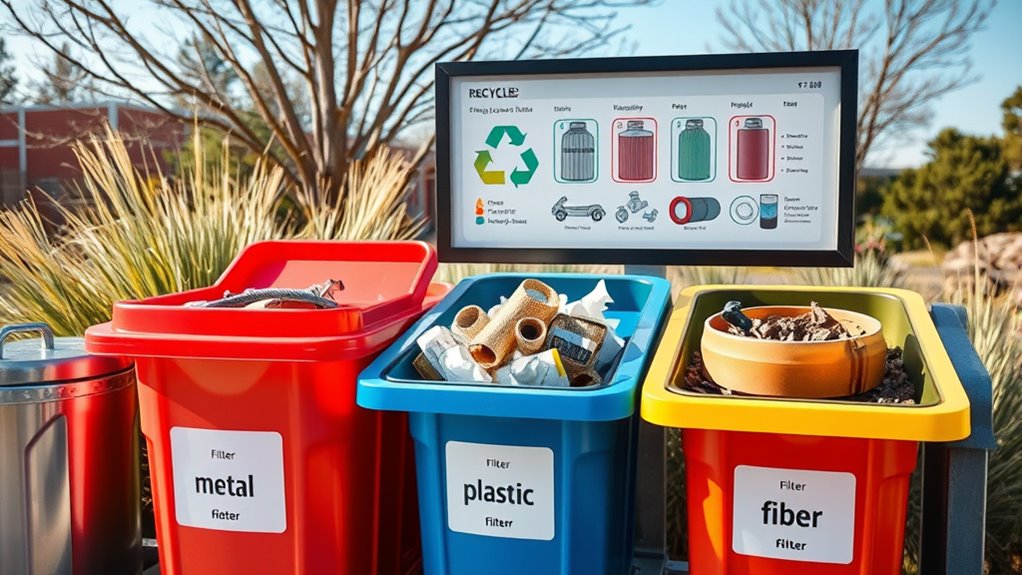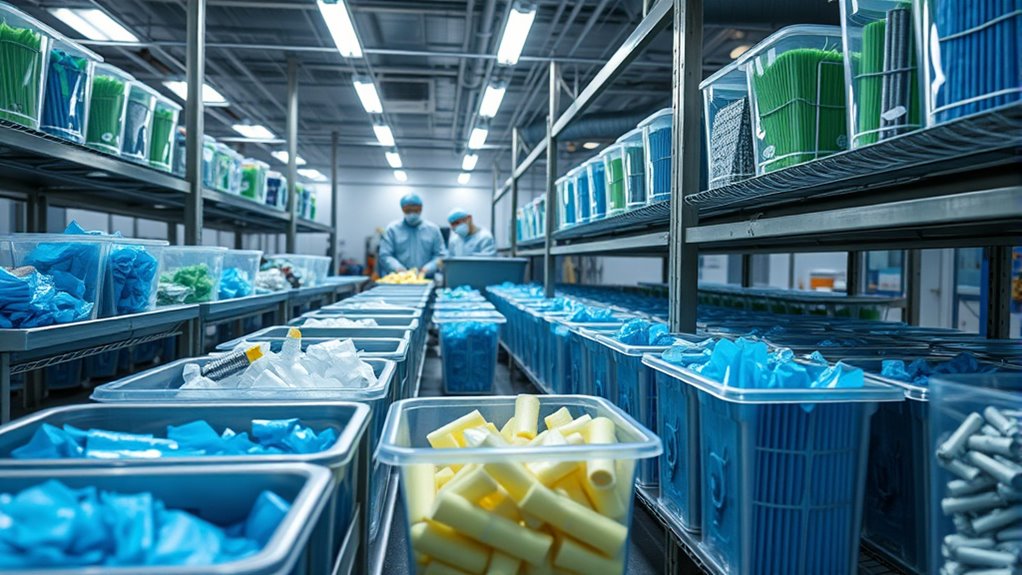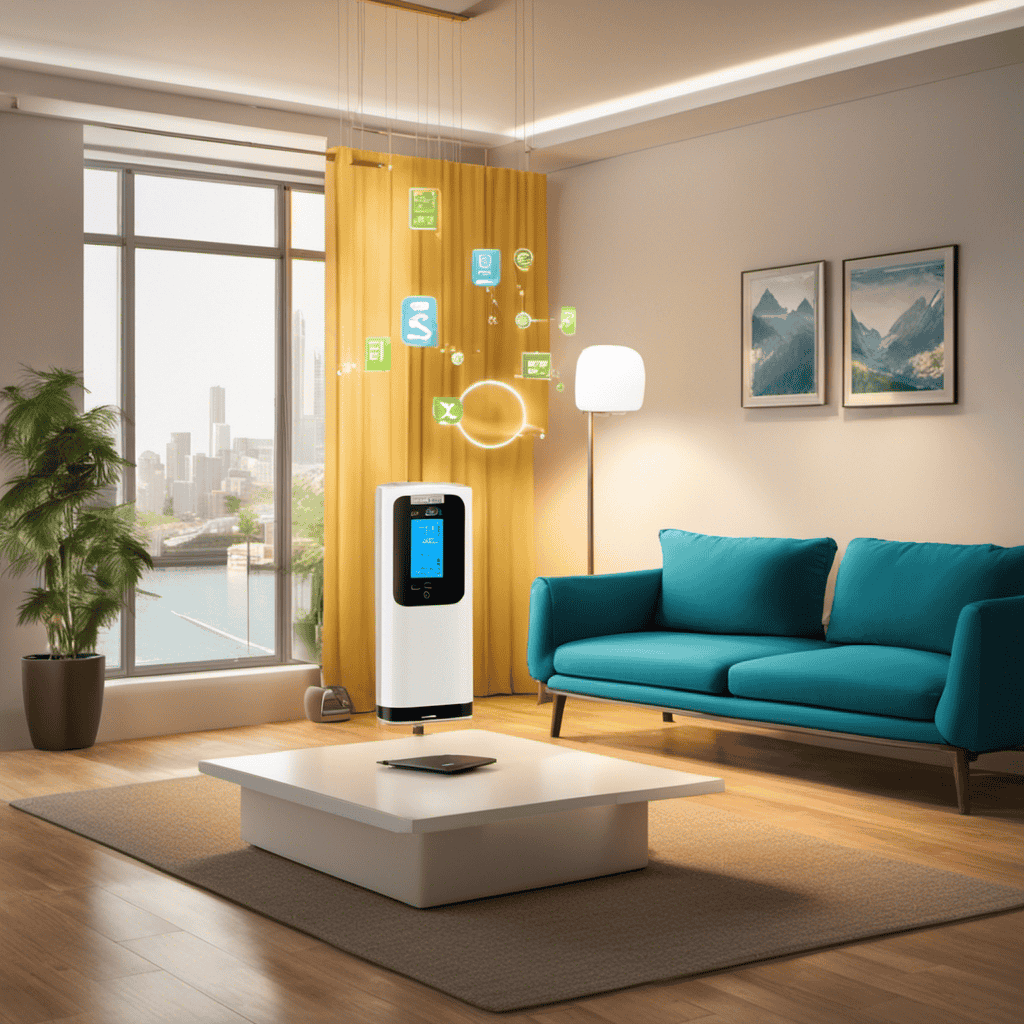Did you know about innovative recycling programs beyond curbside bins? Some centers focus on sorting and preparing plastics for reuse, often using advanced AI systems to improve efficiency. Others transform plastics into building materials or clothing fibers, turning waste into valuable products. These programs increase community participation and reduce contamination, making recycling more effective. If you’re curious, exploring these lesser-known initiatives can reveal new ways to make a difference in environmental sustainability.
Key Takeaways
- Many recycling centers specialize in electronics, plastics, and large packaging, often unknown to the public.
- Advanced facilities use AI and automation to improve sorting accuracy and process efficiency.
- Some programs focus on transforming plastics into innovative products like clothing fibers or construction materials.
- Community-based centers increase accessibility, encouraging more participation beyond curbside recycling.
- Certain programs collaborate directly with recycling facilities to optimize waste processing and reduce contamination.

Have you ever wondered how recycling programs make a difference in your community? It’s not just about tossing your bottles and cans into a bin; it’s about understanding the systems behind those bins and the surprising ways they operate to reduce waste. One key aspect often overlooked is how plastic waste is managed through specialized collection centers. These centers are dedicated facilities where your plastic bottles, containers, and packaging are sorted and prepared for recycling. Unlike curbside pickup, collection centers provide a focused hub for plastic waste, ensuring it’s handled properly and efficiently. When you bring your plastics to these centers, you’re actively participating in a process that transforms discarded items into new products, reducing the need for virgin materials and cutting down on environmental pollution.
The role of collection centers extends beyond just sorting plastic waste. They serve as critical points for educating the public about recycling best practices, ensuring that the plastics brought in are clean and sorted correctly. This reduces contamination, which is a major obstacle in recycling efforts. When you properly rinse and sort your plastics before dropping them off, you help these centers operate smoothly and effectively. Some collection centers are even equipped to handle specific types of plastics, such as those used in electronics or large packaging, making the recycling process more specialized and efficient. This specialization helps prevent valuable plastics from ending up in landfills or the environment.
What makes these collection centers truly impactful is their ability to process large volumes of plastic waste quickly. They often work in tandem with local recycling facilities, where the plastics are melted down, remanufactured, or repurposed into new products. By participating in these programs, you’re directly supporting this cycle, making sure your community’s plastic waste doesn’t just sit in landfills. Instead, it becomes raw material for new items, from clothing fibers to construction materials.
Additionally, many communities are now creating more accessible collection centers to encourage wider participation. These centers make it easier for residents to properly dispose of their plastic waste, especially in areas where curbside recycling might not be available or sufficient. As a result, more plastics are diverted from landfills, and the environmental benefits multiply. When you make an effort to bring your plastic waste to designated collection centers, you’re contributing to a larger movement that aims to reduce pollution, conserve resources, and promote sustainability. It’s a simple act with a powerful impact—one that helps protect the planet for future generations. AI technologies are increasingly being integrated into some recycling processes to improve sorting accuracy and efficiency.
Frequently Asked Questions
Can Used Filters Be Recycled Into New Products?
You might wonder if used filters can be recycled into new products. The answer is yes, thanks to advanced recycling technology that processes filter materials like plastics and fibers. These innovations break down the filters, allowing the materials to be reformed into useful items. By participating in these programs, you help reduce waste and promote sustainability, turning what would be trash into valuable resources through effective recycling technology.
Are Filter Recycling Programs Available Nationwide?
You might wonder if filter recycling programs are available nationwide. While filter disposal can be challenging, many recycling partnerships now accept used filters, making proper disposal easier. Some programs are expanding across the country, but availability varies by location. Check with local recycling centers or manufacturer initiatives to find out if they accept your filters. Participating in these programs helps reduce waste and supports sustainable recycling efforts nationwide.
How Long Does the Filter Recycling Process Take?
Oh, the thrill of waiting! When you send your filters off for recycling, the process isn’t instant magic. Typically, the filter processing and recycling timeline takes about 4 to 8 weeks, depending on the program. During this suspenseful period, your filters undergo careful sorting and repurposing. So, grab a snack and enjoy the anticipation—your eco-friendly contribution is worth the wait!
What Types of Filters Are Accepted in These Programs?
You might wonder about the filter types accepted and recycling eligibility. Generally, programs accept various filter types like HVAC filters, air purifier filters, and certain water filters. Check each program’s guidelines to confirm eligibility, as some only accept specific materials or filters free of contaminants. By understanding these details, you can easily participate in recycling efforts and help reduce waste, making a positive environmental impact.
Are There Any Costs Associated With Filter Recycling Programs?
You might wonder about costs when participating in filter recycling programs. Typically, these programs have minimal or no program fees, making them quite affordable. However, be aware of potential cost implications, such as shipping fees or drop-off charges, depending on the program’s policies. Always check the specific details before joining, so you won’t be surprised by any hidden costs and can choose the most cost-effective option.
Conclusion
Now that you know about these hidden filter recycling programs, you’re like a detective uncovering a secret stash of eco-friendly options. Imagine tossing that old coffee filter into a recycling bin and knowing it’s part of a bigger story—one where small actions lead to big change. Just like a single drop creates ripples across a pond, your efforts can spark a wave of sustainability. Every filter recycled is a step toward a cleaner, greener planet.










